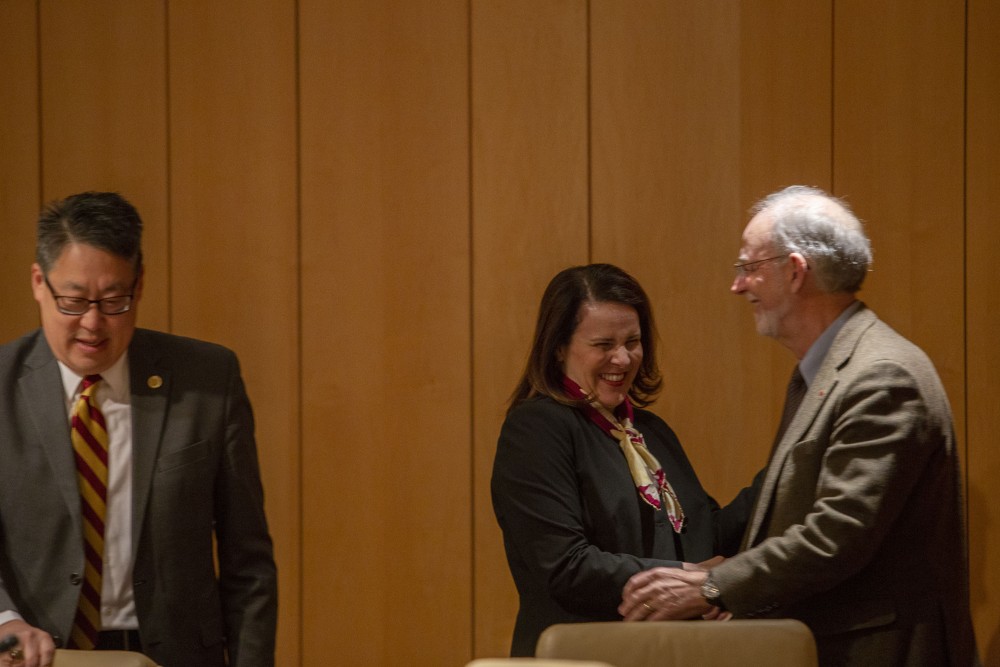Joan Gabel will be the next president of the University of Minnesota.
The Board of Regents voted to confirm sole presidential finalist Gabel at a special meeting Tuesday. Gabel will be the first female president of the University.
Several regents said they look forward to working with Gabel and are ready for new leadership.
“I’m really looking forward to working with [Gabel] and moving the University forward. I think there are so many things at task that have kind of been put on hold at the University, and we just haven’t had the appetite to go after certain things … but I think when a new president comes in we can take another look at everything,” said Regent Michael Hsu.
He wants Gabel to address issues like tuition, student debt and the school’s budgeting process, along with creating the system-wide strategic plan, Hsu said.
Regent Randy Simonson praised Gabel’s commitment to issues facing greater Minnesota and interest in a system-wide strategic plan.
“I was disappointed that some of us were only able to talk to one candidate … that being said I am very supportive of president elect [Gabel]. I think she’s the real-deal, I like her diverse background, she’s very enthusiastic, she’s very committed to some of the things I like … she’s very much a team player. … I really like that concept as a leader,” he said.
Regent Peggy Lucas, who served on the Presidential Search Advisory Committee, said she was happy to see Gabel confirmed as president.
“I’m really, really excited I think she checks so many boxes on what we need as a leader and I just couldn’t be more excited. I’m really excited about the liberal arts,” Lucas said. “I think it’s enriched her whole experience and I’m very excited for her.”
The board also approved Gabel’s five year contract, which includes an annual salary of $640,000.
“I’m pleased … with how [the confirmation process has] gone. … I have confidence in the Board of Regent’s [judgement] and that they’ve selected the right person for the job,” said Rep. Bud Nornes, R-Fergus Falls, member of the higher education committee.
Nornes said he thinks Gabel’s salary is appropriate in comparison to Kaler’s.
Hsu and Simonson said they support Gabel’s base salary, though they also want to see incentive compensation added to her contract.
“I think that was kind of a missed opportunity, but I was willing to support the plan based on the fact that that’s our direction and that we will get there,” Hsu said of incentive compensation.
Last week, the board interviewed Gabel at its December meeting after she visited all five system campuses. Among faculty, staff and students who have met Gabel, she is described as a “good listener,” and a “well-prepared” and “authentic” leader — qualities echoed by those who have worked with her.
While there were initial questions about her non-traditional background in business and law — Gabel has a J.D. rather than a Ph.D. and served as dean of a business school — University members say Gabel alleviated any concerns during her visit to system campuses.
After President Eric Kaler announced in July he would resign a year early, regents tasked the Presidential Search Advisory Committee with presenting the board a list of recommended finalists. While the committee recommended three candidates as finalists, the board selected Gabel as the lone finalist for the position. The other two finalists were unwilling to be publicly named unless they were selected as the sole finalist.
Some transparency advocates and critics said regents “violated the spirit” of public data and open meeting laws by only publicly naming one person. Naming a single presidential finalist aligns with the University’s history of naming lone finalists for top positions, which has drawn criticism and a lawsuit about a lack of transparency.
However, many University members expressed support for Gabel. During the board’s interview with Gabel, Regent Dean Johnson said he would vote to confirm her.
During her interview at the board meeting last week, Gabel talked about the difficulties of higher education, including student debt and achievement gaps.
When asked by regents about her approach to leadership, Gabel described her leadership style as collaborative and praised the University’s shared governance, which allows contribution from faculty, staff and students.
“You have to think of a greater good and be vulnerable to the fact that some people’s ideas might be better than your own and that has fundamentally informed my own leadership,” she said at the meeting.
At the meeting Gabel talked about the University of South Carolina’s approach to addressing achievement gaps, which included examining how the school could better serve current students and then extending that work to students in high school and middle school.
When asked about student debt, Gabel said it’s crucial that universities address the issue and initiate conversation on pricing and access, though a best practice for addressing student debt has not emerged and uncertainty remains.
“We really need to be thinking about clever ways to make sure students can afford education and I think it’s very clear that we are starting to inch up on what the marked can bear, even for students who don’t have fiscal constraints,” she said at the meeting.
Gabel also expressed interest in the position, the University community and the state.
“I have had the most wonderful experience criss-crossing the state, visiting every one of our campuses … every suspicion I had that things were pretty good around here is completely confirmed,” Gabel said at the meeting.








